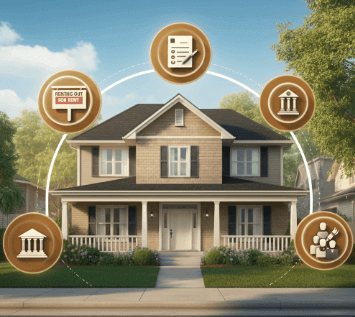In the sunshine state of Florida, homeowners often find themselves considering the best course of action for their property. While selling can seem like the go-to solution, other options are available. This blog explores the top 5 alternatives to selling your house, presenting innovative strategies for those looking for different routes. Understanding these alternatives to selling your house can offer valuable perspectives and unveil fresh opportunities for Florida homeowners, whether due to market conditions, personal circumstances, or plans. Join us as we dive into each option, giving you the information you need to make the best decision for your unique situation.
Among Florida’s leading real estate investors, Steve Daria and Joleigh have showcased innovative alternatives to selling your house. Exploring options such as lease-to-own agreements, these investors have highlighted effective strategies for property owners looking to capitalize on their investments without the traditional sales process. By implementing these alternatives to selling your house, homeowners can find financially beneficial pathways that cater to their unique circumstances.
Key Points
- Renting Out Your Property: Instead of selling, consider renting out your home as a long-term investment. This option allows you to bypass typical closing costs and provides continuous income while retaining ownership.
- Refinancing for Better Terms: Refinancing your mortgage can be a great alternative if you’re looking to alleviate financial pressure. This strategy can help manage a lien on property by potentially lowering monthly payments and interest rates.
- Investing in Storage Solutions: Turning unused space into rentable storage can be a lucrative alternative to selling. This approach utilizes extra space and opens up opportunities to buy storage units as an investment, generating additional income.
- Utilizing a Resident Portal for Management: If you decide to keep your property as a rental, a resident portal can streamline tenant management. This tool helps collect rent, track maintenance requests, and improve tenant communication.
- Home Swapping for Temporary Living: Consider home swapping as a way to explore new living arrangements without selling. This option lets you enjoy different locations while maintaining your home, and it can be particularly appealing if moving is a temporary decision.
Top 5 Alternatives to Selling Your House
When considering the volatility of the real estate market, you may seek alternatives to selling your house that offer financial stability or convenience.
Exploring other options can be especially beneficial in Florida, where the market can be particularly dynamic.
These alternatives provide a pathway to retaining your home and offer innovative solutions to financial or situational challenges homeowners might face.
From renting your property to leveraging home equity, each alternative presents unique advantages tailored to different needs and circumstances.
Here, we explore the top 5 alternatives to selling your house in Florida, offering homeowners a guide to making informed decisions that best suit their personal and financial goals:
1. Repositioning Your Property for Rent
One of the most lucrative and commonly overlooked decisions is transforming your property into a rental space.
The Florida market offers a robust demand for rental properties, especially with the state’s strong tourism and growing industry sectors.
This alternative allows you to retain ownership, maintain a steady income, and potentially benefit from tax deductions, all while delaying the emotionally charged decision to sell.

Furthermore, should property values in your locality be expected to rise, you stand to make a more significant profit.
When considering this option, it’s crucial to factor in property management costs, the wear and tear on your home, and the state’s particularly stringent landlord-tenant laws.
But for many, these are small prices for long-term economic stability and growth.
Get An Offer Today, Sell In A Matter Of Days…
2. Rent-to-Own Agreements
Blending the benefits of renting and selling, the rent-to-own agreement emerges as a mutually advantageous solution for landlords and aspiring homeowners.
This arrangement extends an opportunity for potential buyers who face hurdles in securing a traditional mortgage, granting them the chance to reside in the property while gradually moving towards ownership.
The rent-to-own model offers several advantages for sellers:
- Establishes a predetermined sale price, shielding sellers from potential market fluctuations.
- Landlordspically receive higher rental payments under this arrangement, augmenting their income.
Tenants-turned-purchasers exhibit heightened care for the property, ensuring its maintenance and preservation.
Despite its merits, delving into a rent-to-own contract demands careful consideration, particularly concerning legal complexities, especially in the event of defaults.
Both parties must seek legal counsel to craft a well-structured agreement that safeguards their respective interests and outlines clear protocols for potential contingencies.
3. Refinancing With a Home Equity Line of Credit (HELOC)
Selling one’s home is only sometimes the preferred solution in times of financial strain. Instead of applying for a second mortgage, homeowners can utilize their property’s equity through a Home Equity Line of Credit (HELOC).
This financial tool allows property owners to borrow against the equity they’ve built in their home, using the property as collateral.
One of the primary advantages of a HELOC is its typically lower interest rates than unsecured credit lines or personal loans.
This affordability makes it attractive for funding various needs, from home renovations to debt consolidation or covering unexpected expenses.
However, before opting for a HELOC, homeowners must carefully consider their comfort level when taking on additional debt secured by their home.
While a HELOC provides flexibility in accessing funds, it also entails maintaining regular payments to avoid the risk of foreclosure.
Assessing one’s financial situation and consulting with a trusted financial advisor is crucial in determining whether a HELOC addresses short- or long-term financial needs.
4. Real Estate Partnership or Co-Ownership
Collaborating with another individual to co-own or partner in real estate presents a compelling alternative to selling your house outright.
This shared investment venture can take various forms, from straightforward co-ownership agreements to more intricate structures like Real Estate Investment Trusts (REITs).
By entering into a partnership, you retain partial property ownership while dispersing some financial burdens.

Your co-owner may contribute the capital necessary for property upkeep, or you can invest in enhancements to boost its overall value together.
Entering into a real estate partnership involves complexities that demand careful consideration. Establishing and nurturing a strong, mutually beneficial relationship with your partner is crucial.
Additionally, crafting a legally binding agreement that clearly outlines each party’s responsibilities, rights, and exit strategies is essential.
A warranty deed can play a significant role in defining ownership and ensuring all parties are aware of their entitlements. Moreover, it is important to anticipate and address potential tax implications associated with co-ownership or partnership structures.
Navigating these intricacies demands diligence and foresight. Seeking legal and financial advice from professionals can help ensure that your real estate partnership is structured soundly and set up for success in the long run.
5. Home Equity Conversion Mortgage (HECM)
For homeowners aged 62 and older, a Home Equity Conversion Mortgage (HECM), commonly known as a reverse mortgage, offers an innovative solution to tap into their property’s equity without the burden of monthly mortgage payments.
With a reverse mortgage, the lender gives a steady income stream or a lump sum payment to the borrower; unlike traditional mortgages, borrowers make monthly payments to the lender.
One of the most significant advantages of a reverse mortgage is that the loan can be repaid once the home is sold or the last surviving borrower or eligible non-borrowing spouse moves out or passes away.
This feature makes reverse mortgages particularly appealing for seniors who may be house-rich but cash-poor, as it allows them to access their home equity to maintain their standard of living without having to sell their home.
With a reverse mortgage, elderly homeowners can use the funds in multiple ways, such as covering living expenses, making necessary home repairs or modifications to age in place comfortably, or paying off existing mortgages to alleviate financial strain.
This financial flexibility can significantly enhance the quality of life for seniors and provide peace of mind as they age.
Understanding the complexities and potential risks associated with reverse mortgages is crucial. Borrowers must thoroughly assess the terms and consequences of the loan, including interest rates, fees, and repayment obligations.
It is also important to use tools like a lease calculator to evaluate financial commitments effectively.
Homeowners remain responsible for property maintenance, paying property taxes, homeowner’s insurance, and necessary repairs. Failing to meet these obligations could lead to losing the home.
Therefore, consulting with reputable financial advisors and housing counselors specializing in reverse mortgages is highly recommended before pursuing this option.
Conclusion
Each alternative to selling your house in Florida is a distinct lens through which to view your property. Whether postponing the sale, leveraging your equity, or taking a different approach to ownership, the Sunshine State offers a versatile tapestry of real estate strategies to suit all kinds of situations.
Before making any significant decisions, it’s paramount to conduct extensive research, consult with professional advisors, and understand the implications of each alternative. After all, what may be a setback today could be a springboard to future prosperity tomorrow.
Innovative approaches can foster inventive solutions, easing the stress and burden traditionally associated with real estate transactions. By exploring these unconventional paths, Florida property owners can unlock their assets to the maximum, solidifying stability and opportunity in times of uncertainty.
**NOTICE: Please note that the content presented in this post is intended solely for informational and educational purposes. It should not be construed as legal or financial advice or relied upon as a replacement for consultation with a qualified attorney or CPA. For specific guidance on legal or financial matters, readers are encouraged to seek professional assistance from an attorney, CPA, or other appropriate professional regarding the subject matter.

